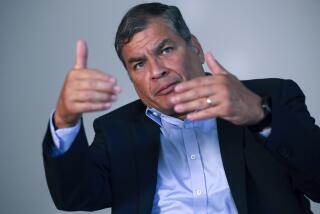New Argentine Leader Will Likely Halt Foreign Debt Payments
- Share via
BUENOS AIRES — The man set to become Argentina’s newest caretaker president is expected to announce today that his government will temporarily stop making payments on its massive foreign debt, as this nation struggles to recover from a week of violence and political upheaval brought about by the collapse of its economy.
Political observers here said late Saturday that Adolfo Rodriguez Saa was likely to be sworn in this morning as Argentina’s third president in a week. His advisors said he would announce the debt moratorium as part of economic measures designed to keep the country afloat until March, when elections are to be held.
The plan is a clear attempt to build popular support for the so-called Peronists, officially known as the Justicialist Party, who were the opposition until days of protest and looting drove President Fernando de la Rua from office last week after a four-year recession that has thrown millions of Argentines out of work. Ramon Puerta, head of the Senate, became president Friday morning but agreed late in the day to step aside in favor of Rodriguez.
Under a timetable worked out by party leaders, Rodriguez, the governor of the rural province of San Luis, will run Argentina until elections in March. Rodriguez is not one of the leading Peronist figures, but he will hold power while the party’s heavyweights fight it out in balloting that will decide who will complete De la Rua’s term, which was to last until 2003.
It remained unclear what would happen when Argentina’s next debt payment is due, $500 million scheduled to be paid Friday, according to Banco Santander Central Hispano Investment.
Even the Peronists’ own economists acknowledge that their plan is fraught with peril.
“It’s going to be a long 60 days, very long,” one of the economists told the Buenos Aires daily newspaper La Nacion. “Maybe too long.”
Rodriguez has said he will not devalue the nation’s currency, the peso, which is traded one-for-one with the dollar. A devaluation could bankrupt many businesses and be a fatal shock to the nation’s banking system.
The new administration is expected to create an unemployment insurance program, with payments to be made, most likely, in government bonds. Those bonds would circulate as a form of “third currency” to used in lieu of dollars or pesos. The same bonds would pay for government salaries and social security.
“The new plan will be absolutely coherent, because we will ensure that the measures have a wide consensus,” Rodriguez told reporters Friday.
Argentina would begin to repay its $132-billion debt later, according to the plan, most likely after the March elections and what promises to be tough negotiations with international banking officials.
The Peronists’ economists say the new administration will be caught in a bind. If it allows the peso to float at a rate of exchange determined by the market, the national currency could plummet, sparking the same kind of hyperinflation that ravaged Argentina in the 1980s.
On the other hand, years of trying to keep the peso’s value tied to the dollar are precisely what has brought Argentina to the brink of a fiscal abyss.
“It’s going to be very difficult for an interim president to do anything in such a short period,” said Martin Redrado, an economist with Fundacion Capital, an independent think tank. Redrado said the Peronists are sure to “un-dollarize” the economy, gradually restricting the use of dollars, which are widely circulated here.
Complicating the economic issues is an unsettled political battle within the Peronist ranks, an agglomeration of diverse interests all claiming to carry the mantle of Gen. Juan Peron, the populist strongman who ruled Argentina from 1946 to 1955 and again from 1973 until his death in 1974.
On Saturday, divisions erupted in the party over procedures for the March voting. One faction was supporting “slate elections” that would allow several Peronist candidates to run at the same time without harming their party’s chances of winning the presidency.
That mechanism was sharply criticized by the Radical Party--until Thursday the party in charge of the government--and by others in the opposition, including some Peronists. These forces said that the joint session of Congress convened Saturday to elect Rodriguez as interim president had no authority to change the nation’s electoral laws.
“This is an illegitimate process,” said Luis Zamora, a leftist congressional deputy from Buenos Aires. “This legislative assembly has nothing to do with the popular will. [The Peronists] weren’t the ones on the streets sacrificing themselves to bring down the government. Until a week ago, they were supporting De la Rua.”
Rodriguez is a 54-year-old grandfather and, like most Peronist politicians, a colorful and controversial figure.
His opponents in San Luis have charged him with enriching himself as governor, a position he has held since 1983. His supporters say he has run the province with great skill, making it one of the few regions in rural Argentina with a budget surplus.
Together with his brother, a former senator, he controls the only important newspaper in the province.
More to Read
Sign up for Essential California
The most important California stories and recommendations in your inbox every morning.
You may occasionally receive promotional content from the Los Angeles Times.











